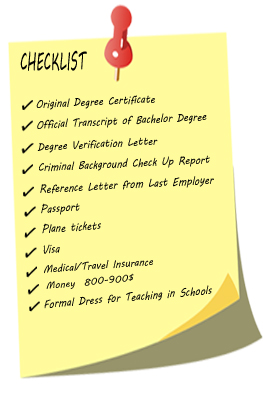BANKING IN THAILAND
Banking in Thailand - Information for TEFL Teachers Thailand
Designed to stop money laundering, and several other frauds, the Banking Law of Thailand has instituted rules regarding the opening of new accounts in Thailand’s banks. The requirements state that to open a new account one must have a work permit. To get a work permit one must work for a company with a certain amount of registered capitalization. Previously, a visitor or expatriate simply had to present a passport, visa and address of the hotel where the applicant was staying.
All the major international banks have their operation in Bangkok and many other cities of Thailand.
Banks are normally open from 9:30-15:30 Monday to Friday except holidays. Currency exchange services of banks have varying office hours but most are open between 8:30-22:00 every day. The authorized money exchange counters of hotels often change 24 hours a day. Major currency bills and travelers cheques are cashed easily at hotels, tourist shops, all provincial banks, shopping centres and money changers. Travelers cheques are best changed in banks (you will need your passport). Rates of exchange at banks or authorized money changers are better than those at hotels and department stores. Baht (THB) is the Thai unit of currency. One baht is divided into 100 satang. Notes are in denominations of 1,000 (brown), 500 (purple), 100 (red), 50 (blue), 20 (green) and 10 (brown) baht. Coins consist of 25 satang, 50 satang, 1 baht, 5 baht and 10 baht. Though the exchange rate of the Baht against other currencies floats and may change daily, Baht has an exchange rate of between 35 and 40 Baht to the Dollar as featured in the current decade.
Bank staff often speaks English so communication in main branches is seldom a problem. Many but not all bank forms are in English as well as in Thai.
Travellers Cheques
Rate is higher for traveller cheques but there is an 8 Baht commission and duty on each cheque cashed so larger denominations save money.
Exchange Control
Foreign visitors may freely bring in foreign banknotes or other types of foreign money. Upon leaving Thailand, a foreign tourist may take out foreign means of payment, which he brought in with him. However, there is a limit on foreign notes or coins to a maximum equivalent of 10,000 US Dollars unless the visitor has declared a higher amount upon arrival. Attempts to take amounts higher than 10,000 US Dollars out of the country without having them declared upon arrival can lead to arrest, confiscation of the excess amount involved and/or prosecution.
No ! restriction on the amount of Thai currency that may be brought into the country. A person travelling to Thailand’s bordering countries and to other countries may take out local currency up to Baht 100,000 and Baht 50,000 respectively without authorization... Foreign tourists are freely allowed to take out gold ornaments."
Credit Cards
It is best suggested that card holders pay cash while shopping in small shops or keep close watch as it has been known for shop owners to make out extra slips, thus getting more money out of you, than your original payment. Credit cards are widely accepted in Thailand and most businesses display stickers for the cards they accept. Shops at times might add an additional charge of 3 to 5 percent when a client pays with his card.
Cash advances of up to 200 US Dollars a day can be obtained from some branches of the Thai Farmers Bank on Visa cards. Some credit cards will get advances but only as traveller cheques. It’s more convenient to go to a credit card representative office if you need an advance.
Remittances
Money remittances from abroad are normally conveniently directed to saving accounts in Thailand..Theoretically, they can be made in one of three forms: either as normal postal remittance, as telegraphic remittance or as SWIFT remittance. In practice, however, they are either telegraphic or most commonly SWIFT - not because Thai banks do not accept postal remittances but because many banks in the West do not offer normal postal remittances anymore.
SWIFT is the abbreviation for Society of Worldwide Interbank Financial Telecommunication and charges are supposed to be lower than other telegraphic transfer charges.
There are in any case only minimal charges for the recipients of telegraphic or SWIFT money transfers in Thailand. However, charges can be considerable for the sender.
Thai banks process the telegraphic or Swift money transfer within one or two days. This differs considerably from experiences in other countries, where money remitted through the SWIFT system or telegraphically has often been available only after around two weeks.
To avoid that such things happening, one may choose a few safeguards. One is, to have remittances sent only to the head offices of banks or only to larger banks, as these are likely to be more familiar with the procedures than smaller ones.
A further very effective measure which, however, entails additional costs is to have the sender not only make the telegraphic remittance but to send a fax of the remittance order to the recipient of the money (not his or her bank). If a fax of the accepted remittance order can be shown, the receiving bank cannot claim that the money maybe hasn’t been sent yet. Another reliable means is to telex the information.
The exchange rate applied is considerably better than the one available for cash. It is the same rate used for letters of credit and other forms of international payment.
Remittances can also be directed to Dollar accounts where they are then credited in Dollars.
Bank Accounts
Foreign visitors can open savings accounts without any problem. Cheque accounts are only available to residents. However, cheques drawn on Thai banks and issued to a certain person can be deposited in that person’s savings account without any problem. They are generally cleared within a day. Cheques drawn on foreign banks can take up to three months for clearing.
Foreigners can open a foreign currency account with any commercial bank in Thailand. The government, on the maintenance of, and withdrawal from the account, imposes no restrictions, as long as the funds originate from abroad. However, banks apply their own varying rules for accounts in foreign currencies (in most cases US Dollars).
Automatic Teller Machines (ATM)
Though not yet widespread, Automatic Teller Machines are also gaining ground in Thailand. As foreign tourists cannot open cheque accounts, access to the Automatic Teller Machines system is limited to Thais and foreign residents. However they can be used with your credit card for cash advances (look for the appropriate logo), & most work on the Delta or Cirrus systems as well.
Safe Deposit Boxes
Safe deposit boxes are in long demand and short supply and rates are often higher than in other countries. Nearly all banks and bank branches grant safe deposit boxes only to clients who also maintain accounts. Some banks even demand that initially, a client who gets a safe deposit box also keeps a considerable positive balance on his account for a specified time period. This varies from bank to bank. Safe deposit boxes can be rented for short or long periods of time.



 I heard great things about this TESOL course from 4 different people who went through it last year. I have always wanted to travel and teach, so this program was perfect for me.
I heard great things about this TESOL course from 4 different people who went through it last year. I have always wanted to travel and teach, so this program was perfect for me.  After looking at other programs in Thailand, I found ACT was offering the lowest price. Also, Kiersten and I came together and her friends had previously done the ACT program and they had nothing but good things to say about the program.
After looking at other programs in Thailand, I found ACT was offering the lowest price. Also, Kiersten and I came together and her friends had previously done the ACT program and they had nothing but good things to say about the program.  The ACT program seemed to be a great way to receive hands on training. It was a great learning experience. Sangeeta and Pak did a great job throughout and I was continually impressed with them and how professional the company was.
The ACT program seemed to be a great way to receive hands on training. It was a great learning experience. Sangeeta and Pak did a great job throughout and I was continually impressed with them and how professional the company was. 